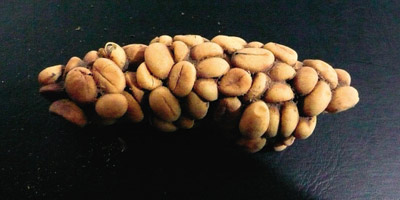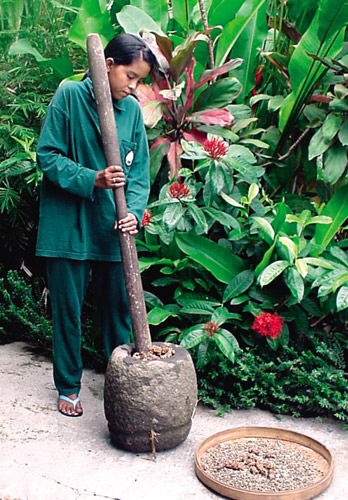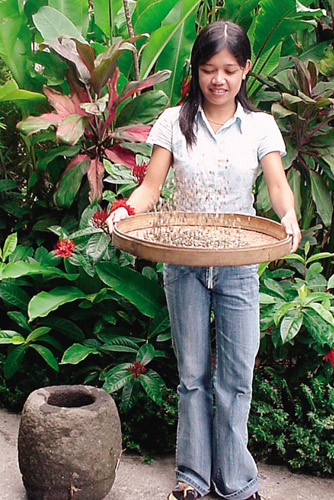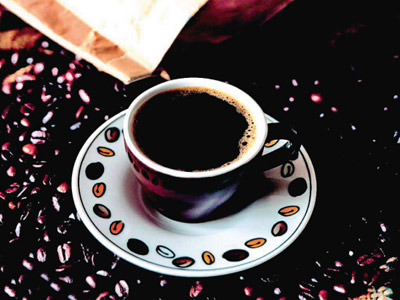The most expensive coffee in the world is fermented in feces.
For coffee lovers, a cup of Jamaica Blue Mountain is nothing special, but if you can drink a cup of Kopi Luwak(aka civet coffee), it is really a lifetime regret.

This coffee has a nickname, called "the most fragrant shit since there is shit", although the name is not very elegant, but it is true. It is the feces of a wild arboreal called the civets on the Indonesian island of Sumatra, where farmers often consider finding civets a blessing because not all civets are lucky to be found. Once a few of these beans are found, locals bend over and pick them up, carefully collect them, and then select, dry, deodorize, process and roast them to make the rarest, most unique, and most expensive coffee in the world.
For a drink, please prepare 50 pounds
In Indonesian,"Kopi" means coffee, and "Luwak" is the Indonesian name for "civet." It is said that the annual production of this coffee does not exceed 500 pounds, and the price per pound ranges from $300 to $800, depending on the year, because there is no fixed production every year.

Coffee beans peeled
Luwak coffee remains a veritable luxury on the international market, not least because it is made not by humans but by wild animals. Traditionally, coffee fruit is washed or sun-dried to remove the peel, pulp and sheepskin layer, and finally the coffee beans are taken out, but Luwak coffee is made by natural fermentation in wild animals.
What's more, these wild animals are only found on Indonesian islands. The time and place of their appearance are mysterious, and their numbers are decreasing day by day. Indonesia has claimed that conservation and breeding have helped keep the civets stable, but the digestive system that created them to tempt human taste buds has nothing to do with industrial-age products.
"Rare is expensive", which has led to the high price of Kopi Luwak, a rare treasure. I'm afraid you can prepare 50 pounds for a cup of coffee, and you may not find it anywhere.

Amazing natural fermentation
"Civets" are omnivores. They are solitary and nocturnal. They inhabit tropical rain forests, subtropical evergreen broad-leaved forests, mountain shrubs or hills, mountains, grass and other places below 2000 meters above sea level. Its food includes small mammals, birds, amphibians and reptiles, crustaceans, insects and plant fruits, seeds and so on.
"Civet" likes to choose the most ripe, sweet, full and juicy coffee fruit in the coffee tree as food, and the coffee fruit passes through its digestive system, only the pulp of the fruit is digested, and the hard coffee beans are then excreted intact by the "civet" digestive system. This is the "natural fermentation method" that was once scorned by Americans. It is said that when Americans heard that there was a way to make coffee in this way, they thought it was a fantasy until it was reported by National Geographic magazine.

Coffee Bean Screening
This digestion process, so that coffee beans have an unparalleled magical change, flavor tends to be unique, taste particularly mellow, rich and mellow sweet taste is also unmatched by other coffee beans. This is because the digestive system of the "civet" destroys the protein in the coffee beans, making the bitterness of the coffee produced by the protein much less, but increasing the round taste of the coffee beans.
Experts say the Indonesian civet has a gland near its sex organs that secretes milky oil, which has long been a precious ingredient in perfume, even Shakespeare's King Lear has such dialogue: "Please give me some civet oil to stimulate my inspiration." Another said,"This coffee is unique and Indonesian. Drinking it is like finding a diamond in a stone." Because the wild civet is obviously better at picking good coffee fruits, this coffee has a unique character.
Delicious or hard to swallow?
It is said that experts who have tasted this coffee have gone to two extremes in their evaluation of its taste. One describes the coffee as "the best in the world", which tastes unusual and difficult to describe in words: "with a bit of earthy smell, slightly choking and visceral taste, in the mouth for a long time, until the last drop." The other comment was the exact opposite: "It's hard to swallow, it's a gimmick, it's not worth the money to buy stinky coffee."

Roasted civet coffee
Coffee experts say Luwak coffee is mostly low-altitude robusta beans, suggesting that the civet prefers robusta beans to higher-altitude Arabica beans. Indonesian coffee itself has earthy and herbal flavors, and its consistency is also the highest among continental coffees, but Luwak coffee has a better earthy flavor and consistency, especially its consistency is almost close to syrup, and its aroma is very special (if it can be described as aroma).
So if you don't like the taste of Indonesian coffee in the first place, you'll probably hate Luwak coffee more, but if you like the earthy taste of Indonesian beans or Indian beans, you'll probably love Luwak coffee with a similar flavor.
At a tasting session, celebrities savoured every aroma of Luwak coffee without being told the truth and tried to describe their sensory reactions in flowery terms. However, when people learned about the origin of this drink, they felt the same stomach discomfort. Luwak's salespeople suggest that if you're going to serve the coffee to a guest, either never tell him the truth or tell him where it came from in advance and let him decide whether to drink it or not, lest he overreact.
Important Notice :
前街咖啡 FrontStreet Coffee has moved to new addredd:
FrontStreet Coffee Address: 315,Donghua East Road,GuangZhou
Tel:020 38364473
- Prev

11 reasons why tea beats coffee
Tea leaves a good impression in people's minds all the time. The specific composition is as follows: the chemical composition of tea is composed of 3.5-7.0% inorganic matter and 93-96.5% organic matter. There are about 27 kinds of inorganic mineral elements in tea, including phosphorus, potassium, sulfur, magnesium, manganese, fluorine, aluminum, calcium, sodium, iron, copper, zinc, selenium and so on. In tea
- Next

For that strong cup of coffee Vietnamese coffee
Always like the smell of coffee, that kind of intoxicating sweetness, so that I can not resist. But every time I drink it, I can't help but feel a little disappointed. The bitterness always reminds me of the traditional Chinese medicine I drank when I was young, while the coffee with too much sugar no longer has its unique fragrance. So instant coffee has become my first choice. I don't need to taste it carefully. I just want to refresh myself. Before I went to Vietnam, I had friends.
Related
- Beginners will see the "Coffee pull flower" guide!
- What is the difference between ice blog purified milk and ordinary milk coffee?
- Why is the Philippines the largest producer of crops in Liberia?
- For coffee extraction, should the fine powder be retained?
- How does extracted espresso fill pressed powder? How much strength does it take to press the powder?
- How to make jasmine cold extract coffee? Is the jasmine + latte good?
- Will this little toy really make the coffee taste better? How does Lily Drip affect coffee extraction?
- Will the action of slapping the filter cup also affect coffee extraction?
- What's the difference between powder-to-water ratio and powder-to-liquid ratio?
- What is the Ethiopian local species? What does it have to do with Heirloom native species?

